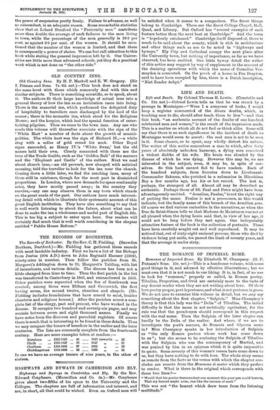ROMANCE OF IMPERIAL ROME.
Romance of imperial Rome. By Elizabeth W. Champney. (G. P. Patnam's Sons: 15s. net.)—This is a handsome volume, with some good things in it, and adorned by effective illustrations; but we must own that it is not much to our liking It is, in fact, of no use to look for "romance," properly so called, in Roman poetry. Tibullus, Propertius, and Ovid are certainly more to the taste of any decent reader when they are not writing about love. Of their love poetry proper, part is pretence, and what is not pretence is gross. We do not care to examine this volume in detail, but we may say something about the first chapter, "Sulpicia." Miss Champney's theory is that this lady was the "Delia of Tibullus. The initial difficulty is that the name is not metrically equivalent, for the rule was that the pseudonym should correspond in this respect with the real name. Then the Sulpicia, of the later elegies can hardly be the Delia of the earlier. And where, if we are to investigate the poet's amours, do Nemesis and Glyeera come in? Miss Champney speaks in her introduction of Sulpicia as "the only Roman poetess whose work has come down to us "; but she seems to be confusing the Sulpicia of Tibullus with the Sulpicia, who was the contemporary of Martial, and was praised by him in an epigram which it is quite impossible to quote. Some seventy of this woman's verses have come down to us, but they have nothing to do with love. The whole story seems as remote from the facts as the verses with which the chapter con- cludes are remote from the Memnona si meter which they profess to render. What is there in the original which corresponds with these two lines ?— " Would that his genius transcendent one moment this poor pen could borrow, That may lament might arise, rise like the incense of nard."
This was not "the lament which drew tears from the listening multitude."






















































 Previous page
Previous page